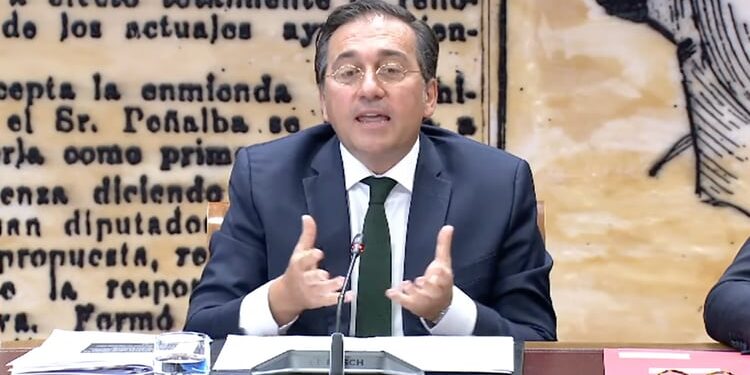Alberto Rubio
Faced with the PP’s demand that the Spanish government “formally recognise Edmundo Gonzalez as the legitimate head of state”, the Minister of Foreign Affairs, José Manuel Albares, yesterday used diplomatic prudence in the Senate to announce that he is maintaining contacts with the Venezuelan government and opposition with the aim of moving towards a “dialogue-based” and “negotiated” solution to the current crisis.
Albares assured that “the Government of Spain has never stopped supporting the Venezuelans” and branded as “lies and falsehoods” the accusations of the spokesperson for the Popular Party, Alicia García – “you are Maduro’s main ally in the EU” – and stressed that “the EU sanctions (against the regime of Nicolás Maduro) are maintained” at Spain’s request.
The minister said that in recent days he had been in telephone contact with his Venezuelan colleague, Iván Gil, and with the opposition leaders, María Corina Machado and Edmundo González, as well as with leaders of the European Union and Latin America “to make progress in the dialogue”. However, the PP failed to obtain explicit recognition of the opposition candidate’s victory in the 28 July elections.
Albares insisted on several occasions that the Spanish government is working “on the side of democracy, human rights and respect for fundamental rights” and called on all parties represented in the Senate Foreign Affairs Committee, especially the Popular Party, to “join the government in these actions”.
Albares expressed surprise at the PP’s attacks after, as he said, he himself had contacted Alberto Núñez Feijóo to inform him about the crisis in Venezuela. “He knows perfectly well what we are doing,” he said, before accusing the PP of using the Venezuelan crisis for “political opportunism”. “We work while you pretend to work,” he replied to Alicia García.
With practically all parties agreeing that the Maduro government should “accept the results, stop the brutal repression and negotiate a peaceful transition”, as the spokesperson for the Basque Group, Luis Jesús Uribe-Etxebarría, summed up, the senators had time to engage with the minister on other more “particular” issues. Alicia García (PP) demanded that the government “disavow Zapatero for his complicity with the Maduro regime”; Ángel Gordillo (Vox) included the EU High Representative for Foreign Affairs, Josep Borrell, in the fray, accusing him of “working in favour of the Venezuelan dictatorship”; Eduardo Pujol, of Junts, took the opportunity to defend Carles Puigdemont and criticise the “raising of togas in the face of the popular will expressed at the ballot box” in a Spain “that wants to give lessons in democracy about Venezuela”; and Juanjo Ferrer, of the Confederal Left Group, asked for explanations for the trip of the Senate committee that could not enter Venezuela “because nobody understands that we spend 9. 9,000 euros for nothing”.
Albares did not waste too much time responding to these “domestic” criticisms. Faced with the PP, he defended Zapatero because “he does a job that the government appreciates and values, having participated in numerous mediations and the release of political prisoners. He reminded the Vox spokesman that “you defend a head of state (Javier Milei) who came here to insult the President of the Government”. And to the Junts representative he replied without mentioning Puigdemont: “the government and in particular the Minister of Justice act in favour of fundamental rights”.
Returning to the heart of the debate, Albares assured that both María Corina Machado and Edmundo González cited Spain as the first European country when thanking “our position and our efforts”. And he expressed his hope that all the political groups “will come out of here united” and in agreement that “we can continue talking to everyone”, government and opposition, because “we need a solution among Venezuelans”. After recalling the number of Venezuelans living in Spain and vice versa, the minister ended his speech by stating that “there is a lot at stake for both Venezuelans and Spaniards”.
In addition, Albares said that, as a result of the contacts with the Venezuelan government, Spain will represent the diplomatic interests of the Dominican Republic after the departure of its personnel. “Spain will always be available to all countries and all brotherly peoples of Latin America,” he said.






